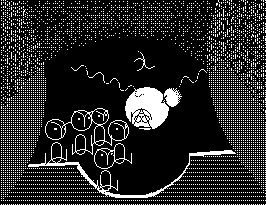After the global haiku style last time, I tried to look for haiku shining
in a local color.
This haiku is by
John Bird in Australia; and I found it in
"The Long Paddock":
a collection of his 74 haiku honoring Australian working women.
John says, " My forebears were pioneers on the Hunter, Manning, Tweed,
Nerang and other
rivers up into Far North Queensland. The "Bird women" were the glue of
their families
and my mother is an exemplar of the spirit of the outback."
He observed his mother closely for his haiku. This haiku is at the top
of
"50,000 Years" (the duration of aborigine history) in "The Long Paddock."
Don't you hear a voice from 50,000 years ago through this haiku?
If you are in the northern hemisphere, remember that the Australian seasons
are opposite from yours.
In the EL and Japanese translation, I used ears (of them) instead of "they,"
expressing that everybody becomes the ear to listen to her story.
前回のグローバル・ハイクから目を転じてローカル色が光る作品を探してみました。
作者のオーストラリア在住ジョン・バード
さんは、オーストラリアの働く女性の姿を
The Long Paddock(長い牧草地)に74句つづりました。
この句は、その内のタイトル「5万年」のトップに出ています。
5万年は、オーストラリア先住民の歴史時間です。ジョンさんの祖先は奥地に入った
パイオニアで、女性たちは家族を結ぶ存在、そんな奥地の伝統を身につけた彼のお母さんが、
「彼女」として俳句に詠みこまれています。彼の地5万年前からの声がきこえてきそうですね。
オーストラリアは、これから夏です。
 Original English haiku by John Bird:
Original English haiku by John Bird: 




 {
{ : nature,
: nature,  : hole/cave (洞穴)
: hole/cave (洞穴) {
{ {
{ grains,
grains, rock} sand},
rock} sand},  place}: (砂漠)
place}: (砂漠) {
{ nature,
nature, hard}: rock (岩)
hard}: rock (岩) {
{ space}: hole/an empty space in which something could be, but not go through
space}: hole/an empty space in which something could be, but not go through time(also a part of sound)/ear-shape,
time(also a part of sound)/ear-shape, sense}: ear(s) (耳)
sense}: ear(s) (耳) preposition
mark)} : to, for (~へ)
preposition
mark)} : to, for (~へ) in/female,
in/female, recognition,
recognition,